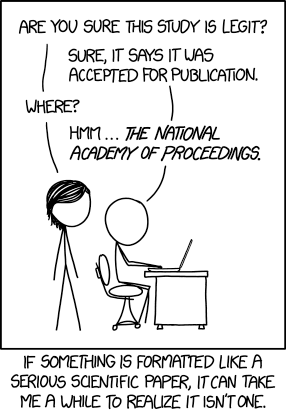If you need help identifying the quality of a journal, reach out to your liaison librarian for assistance. We can help you evaluate the quality of a journal and teach you some tips and tricks for how to evaluate a journal on your own. We can also help you identify high-quality journals that are a good match for your research.
Predatory publishing is an exploitative practice that uses the promise of fast, open access publication to extract money from authors and researchers. Often, predatory journals will charge high fees to publish in their journal, but provide little to no peer review, editing, or oversight of the content. In practice, this means they take money from (usually) well-meaning researchers but do not provide any of the services that a publisher is supposed to provide. This means that good research can languish in poor quality journals with little research impact, and that bad research can be easily published due to the lack of peer review or editing.
It is important to note that while most predatory publishers share certain characteristics, some of these characteristics are also shared with newly created journals and journals from developing countries. Reviewing the quality of a journal requires a careful examination and subjective appraisal of it, using your best judgment. It is also important to note that journal quality is not an indication of research quality. There are many good articles published in bad journals, and plenty of bad research published in journals with good reputations.

From xkcd.com
Below are links to a couple of online journal publishers of questionable quality. They can act as useful examples of red flags to look for when evaluating journals.

This is an example of an actual solicitation email an ATSU librarian has previously received. Note the improper name and title, use of informal language and styling, poor spelling and grammar, and overall confusing message.
If you need help identifying the quality of a journal, reach out to your liaison librarian for assistance. We can help you evaluate the quality of a journal and teach you some tips and tricks for how to evaluate a journal on your own. We can also help you identify high-quality journals that are a good match for your research.